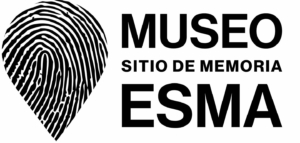In the context of the inauguration of the temporary exhibition Being Women at ESMA, Testimonies to Look Again, the Museum organized a marathon of short conversations between young feminists and women associated to this Clandestine Center. Participants included ESMA survivors Miriam Lewin, Ana Testa and Ana Soffiantini; Carolina Varsky, plaintiff of Case 1270; María del Carmen Roqueta, judge of the Systematic Plan to Steal Babies; Mercedes Soiza Reilly, former prosecutor of the unified ESMA Case. Each one of them had a conversation with young women Juli Epstein, president of the student’s council of the Nacional Buenos Aires School; Antonella Costa, actress; Malena Sánchez, actress; Analía Cid, photographer at Pandilla Feminista; Agnes Simon, artist, and Emilia Giordano, sociologist and Museum guide. Journalists Sonia Santoro and Florencia Alcaraz moderated the conversations.
The first conversation was held by Analía Cid and Mercedes Soiza Reilly. They both chose photography as a guiding threat. Soiza Reilly mentioned how photography affects the way we tell a story. Audiences breathe memory. Analía Cid said that it’s very important to keep a record. It’s not the absolute truth, because truth is built collectively.
The second conversation featured Ana Testa and Malena Sánchez. Ana Testa remembered: these guys were so perverse… Acosta was gone and we had D’Imperio, who celebrated birthdays and used to bring make-up for us to wear. Some of the kidnapped women refused. As a tribute to them, we need to keep speaking out.
Miriam Lewin and Agnes Simon, also known as Femigansta, had the third conversation. When Simon asked how do justice and reparation feel for a survivor, Lewin pointed out that there full reparation doesn’t exist. Wounds never heal. The preparation of those who must act in front of a victim must be solid enough to listen, comfort, and provide a way out. At the trials, we were so exultant because the pilots had been convicted, but we didn’t realize that sex crimes were never considered.
The fourth conversation featured Ana Soffiantini and Juli Epstein. Soffiantini mentioned that ESMA was ESMA one of the many places of horror, but there was also love stories and the will to create. I was harassed in here and I kept being abused outside, in my ideas. Democracy allowed us to reconstruct ourselves.
The fifth conversation was held between Carolina Varsky and Antonella Costa. Costa talked about her experience during the shoot of Garage Olimpo: she committed herself to the movie without reading the script, because already in that time uncertainty was the worst kind of torture. Film director and survivor made us experience that uncertainty. I didn’t even know I was the lead character.
María del Carmen Roqueta and Emilia Giordano were part of the sixth and last conversation of the day. It was very difficult for me to work surrounded by men, being the only female judge, said Roqueta. Out of 18 Federal Courts, she was the only woman. Law doesn’t demand heroes, it demands common people, so it was hard to move forward, to set the boundaries, how we manage, the way they left us. Giordano refereed to the set up of the temporary exhibition: When we were planning the exhibition, we thought about how the courts weren’t able to hear these women.
Near the end, Miriam Lewin said: today is a historic day; it’s a turning point, because today feminism entered into the Site of Memory forever.



